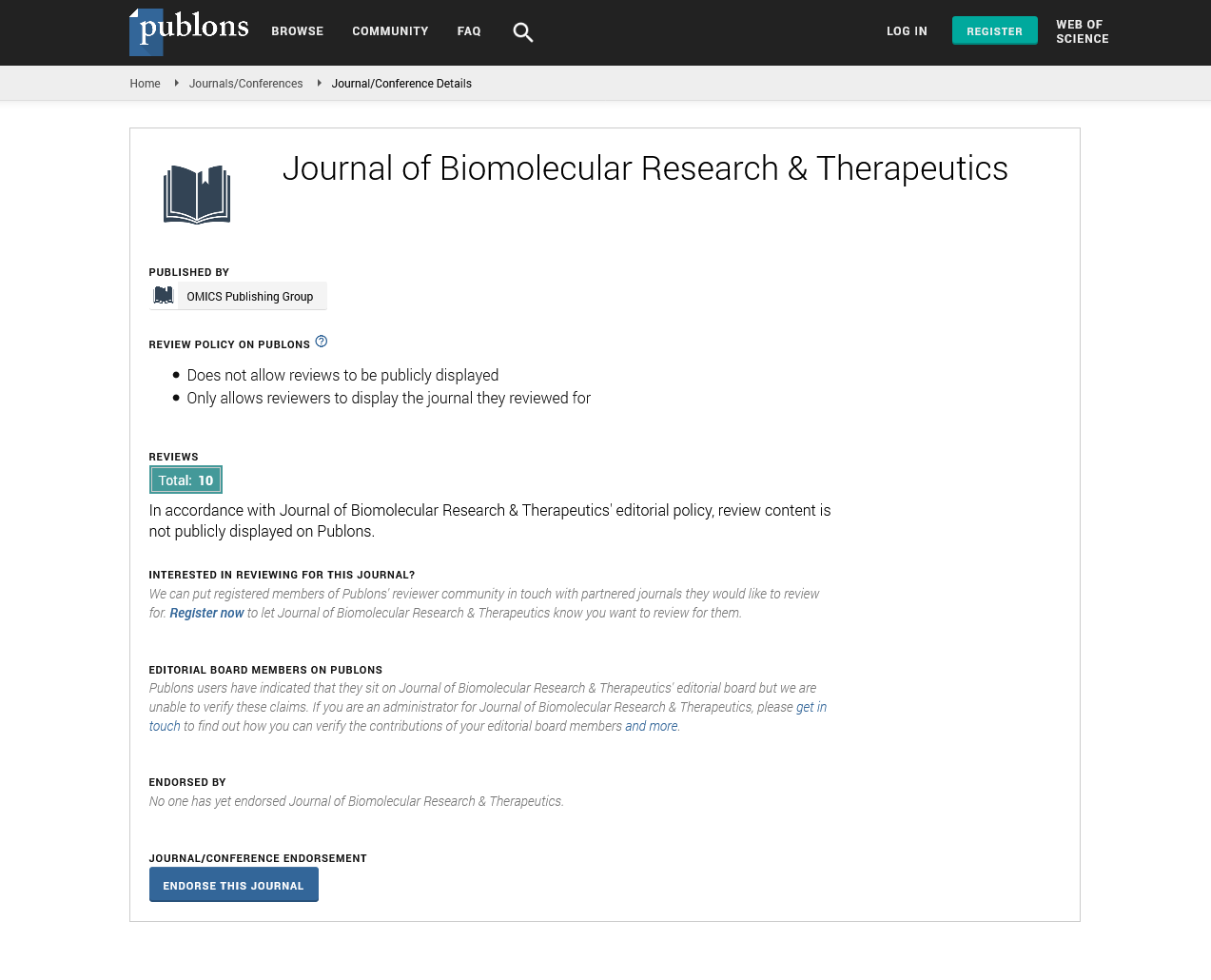Indexed In
- Open J Gate
- Genamics JournalSeek
- ResearchBible
- Electronic Journals Library
- RefSeek
- Hamdard University
- EBSCO A-Z
- OCLC- WorldCat
- SWB online catalog
- Virtual Library of Biology (vifabio)
- Publons
- Euro Pub
- Google Scholar
Useful Links
Share This Page
Journal Flyer

Open Access Journals
- Agri and Aquaculture
- Biochemistry
- Bioinformatics & Systems Biology
- Business & Management
- Chemistry
- Clinical Sciences
- Engineering
- Food & Nutrition
- General Science
- Genetics & Molecular Biology
- Immunology & Microbiology
- Medical Sciences
- Neuroscience & Psychology
- Nursing & Health Care
- Pharmaceutical Sciences
Perspective - (2024) Volume 13, Issue 1
Immuno-PCR: Balancing Sensitivity and Specificity in Biomolecular Detection
Ane Gronta*Received: 29-Jan-2024, Manuscript No. BOM-24-25389; Editor assigned: 31-Jan-2024, Pre QC No. BOM-24-25389 (PQ); Reviewed: 14-Feb-2024, QC No. BOM-24-25389; Revised: 21-Feb-2024, Manuscript No. BOM-24-25389 (R); Published: 28-Feb-2024, DOI: 10.35248/2167-7956.23.13.365
Description
In the search of biomolecular detection, sensitivity is important. The ability to detect minute quantities of specific molecules with precision and accuracy has extreme implications across various fields, from clinical diagnostics to biomedical research. In recent years, an innovative technique has featured on the development, offering unique sensitivity and versatility: Immuno-PCR (IPCR). This innovative approach combines the specificity of immunoassays with the amplification power of Polymerase Chain Reaction (PCR), revolutionizing the landscape of biomolecular detection.
Immuno-PCR combines the principles of immunoassays, which depend on the binding affinity between antibodies and target molecules, with PCR, a technique for increasing specific DNA sequences. The result is a synergistic platform that enhances the sensitivity and quantification capabilities of traditional immunoassays, enabling the detection of biomolecules at very low concentrations.
One of the fundamental advantages of immuno-PCR lies in its ultrasensitive nature. By coupling the exquisite specificity of antibodies with the exponential amplification of PCR, immuno- PCR can detect analytes with femtomolar to attomolar sensitivity, fixed up the limits of conventional immunoassays by orders of magnitude. This sensitivity opens new methods for detecting biomolecules that were previously undetectable or present at trace levels, offering insights into disease mechanisms, biomarker discovery, and therapeutic monitoring.
Moreover, immuno-PCR offers exceptional versatility and flexibility in its applications. It can be adapted to detect various types of analytes, including proteins, peptides, nucleic acids, and small molecules, making it a versatile tool for various research and diagnostic purposes. Whether profiling protein biomarkers in cancer, monitoring viral infections, or quantifying circulating nucleic acids in liquid biopsies, immuno-PCR provides a strong and customizable platform for biomolecular detection.
The impact of immuno-PCR extends beyond the search of basic research, with extreme implications for clinical diagnostics and personalized medicine. In the search for early detection and precise diagnosis of diseases, the ability to detect biomarkers with high sensitivity and specificity is important. Immuno-PCR holds potential for enhancing the accuracy of diagnostic tests, enabling clinicians to detect diseases at earlier stages when interventions are most effective.
Furthermore, immuno-PCR has the potential to revolutionize the field of therapeutic monitoring and drug development. By enabling the precise quantification of drug targets, biomarkers, and therapeutic molecules in biological samples, immuno-PCR can accelerate the development and evaluation of novel therapeutics, guiding treatment decisions and improving patient outcomes.
Despite its tremendous potential, immuno-PCR is not without challenges. The complexity of the technique, mixed with the need for specialized equipment and expertise, may limit its deep adoption, particularly in resource-limited settings. Moreover, optimizing assay conditions and minimizing nonspecific growth are ongoing areas of research and development.
Nevertheless, the potential of immuno-PCR as an ultrasensitive immunoassay for biomolecular detection is certain. Its ability to expand the limits of detection sensitivity and quantification accuracy has the potential to transform our understanding of disease mechanisms, facilitate early diagnosis, and advance personalized therapeutic interventions. As researchers continue to refine and expand the capabilities of immuno-PCR, we stand on the brink of a new era in biomolecular detection.
In conclusion, Immuno-PCR represents a notable convergence of immunoassay specificity and PCR increase power, offering an ultrasensitive platform for biomolecular detection. Its ability to detect analytes at femtomolar to attomolar concentrations, mixed with its adaptability and potential for clinical translation, positions Immuno-PCR at the primary position of biomolecular research and diagnostics.
As we continue to resolve the complexities of disease biology and aim for precision medicine, Immuno-PCR holds immense potential for advancing our understanding of disease mechanisms, facilitating early diagnosis, and guiding personalized therapeutic interventions. While challenges remain in terms of optimization, standardization, and accessibility, the transformative impact of Immuno-PCR on biomedical research and clinical practice is clear.
Citation: Gronta A (2024) Immuno-PCR: Balancing Sensitivity and Specificity in Biomolecular Detection. J Biol Res Ther. 13:365.
Copyright: © 2024 Gronta A. This is an open access article distributed under the terms of the Creative Commons Attribution License, which permits unrestricted use, distribution, and reproduction in any medium, provided the original author and source are credited.

